MEN IN MASKS
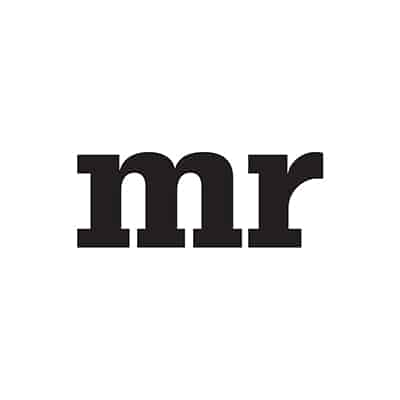

As stores open up across the country, our industry is showing its trademark creativity by making and selling face masks. Although most consumers initially grabbed the ubiquitous pleated dust masks or tied jaunty—if inefficient—bandanas around their faces, it wasn’t long until customers were demanding something more effective, tasteful, or statement-making to help prevent the spread of COVID-19.
ANSWERING THE CALL
Unsurprisingly, numerous menswear brands and retailers across the spectrum have responded to the call. In many cases, these companies weren’t even focused on making a profit; instead, making masks became about keeping workers employed, as well as donating any proceeds or a matching number of masks to charities, essential workers, and others in need.
“We decided at the beginning of the pandemic not to sell masks, but instead to make complimentary ones in our tailor shop for those in need of additional PPE (hospitals, nursing homes, etc.),” says Brad Sherman of Minneapolis-based retailer Hubert White. “We also made masks to give away to customers who visit the store. This has been a great thank you gift, as venturing out was, and still is, a dicey decision for many.”
When Andrisen Morton in Denver closed during the initial COVID-19 lockdown phase, the store kept its tailor shop open, making 350 masks that were donated to Children’s Hospital of Colorado and the Denver Botanic Gardens. “We used fabrics from Hamilton and Emanuel Berg from our custom shirting programs,” says Lindsay Morton Gaiser. “It was an opportunity for us to do something charitable and it provided us with a sense of purpose.”
When Denver’s stay-at-home order expired in early May, Andrisen Morton reopened and masks became a literal must-have item. “Now masks are a thing and we have to embrace it,” says Morton Gaiser. “People want comfort, but don’t want to look like surgeons. We sell masks from Edward Armah ($50 MSRP) and people love them. We’re selling them to both men and women: we can’t keep them in the store!” (Armah’s masks are also selling on the store’s recently launched online platform.)
At Bloomingdale’s, face masks range from $15 to $40. “We have an assortment of unisex face masks from brands like Medipop, Echo and Sol & Selene, along with kids’ masks from Kid Dangerous,” says Joyce Packman, VP/DMM for handbags and seasonal accessories. “The curated selection features both solids and trend-driven prints, including denim-printed and tie-dye options, making it easy for shoppers to find a mask that fits their personal style.”
“Flat face masks have been very popular with our customers and we think they will continue strong,” says Stephanie Muehlhausen, senior director at Macy’s fashion office, center core, and beauty. “Our customers prefer multi-packs that offer variety, with prints, geometrics, and animal patterns now being customer favorites. Black is the most popular solid, but we’ll continue to expand our assortment to inspire shoppers to showcase their individual style.”
BRANDED INGENUITY
“I never thought a mask would be a lifestyle item,” says Armah. “Mine are for a guy who wears suits and wants a lifestyle appropriate mask.” The acclaimed accessories designer creates his masks from Pima cotton and also includes space for a replaceable filter. Each made-in-NYC mask comes with a matching pocket circle. “We sold 800 in a couple of days right after we launched them. Customers say it’s the best mask they’ve ever tried.” Beyond Andrisen Morton, Edward Armah masks are also carried at J3 Clothing in Cleveland and Drest by Scott Malouf in Lubbock, Texas.
Lifestyle brand Faherty launched a pilot mask program in March with “explosive growth,” says Alex Faherty, CEO. “We’ve expanded our style offering significantly since then, as well as our partners. To meet demand, we’ve begun selling them through online retailers East Dane and Shopbop, as well as specialty stores like Stag Provisions, Darien Sport Shop, Oak Hall, and Trevor Furbay.” Faherty’s masks are priced at a consumer-friendly $10 retail and summer-weight styles in upcycled artisan fabrics and tie-dyes have been strong sellers.
Denim maker Mavi utilizes a particular technique to stretch the material, and special stitching to ensure a secure fit around the nose. The mask is available in two sizes; they suggest a small/medium for women and a large/extra-large for men. Available on the brand’s website, as well as through Kane Menswear in Northern California and R&R Menswear in Palm Springs, they come in blue camo, animal, and bandana prints starting at $15 for a bundle of two, $20 for three, and $30 for five.
When the pandemic first hit, Raleigh Denim Workshop’s Victor Lytvinenko recognized that he had the machines, fabrics, and staff to make masks, but didn’t know enough about PPE requirements. “We got in touch with Burlington Industries, who donated medical-grade fabric; three of our sewers made several hundred masks daily in our factory. For every mask sold, we’d donate two to frontline workers. We didn’t know what the future held for our business at that point, but we knew that if we were going down, we were doing down helping.” Lytvinenko also placed the brand’s mask pattern on the Raleigh Denim website so any home sewer could easily download it and make his own.
Ruth Graves of S.T.E.P. USA is making hand-finished masks in Como, Italy. “I’m making a sophisticated mask, mainly in solids, from the finest fabrics. They’ll have removable inserts for extra protection, and coordinate with my new pocket squares. I’m focusing on guys who want a look of timeless elegance plus comfort.”
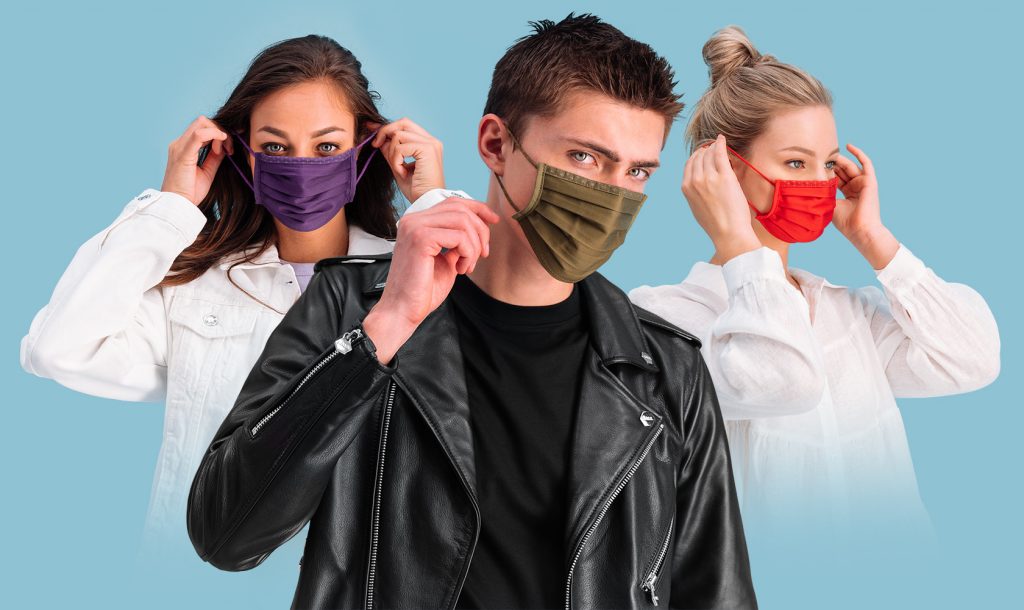
Luxury tailored clothing maker Samuelsohn retooled its operations when the pandemic hit, making masks and other medical-grade PPE for hospitals. Combining technical expertise with its apparel background, they created a product that’s both fashionable and functional. “We’re now approved as a medical supply company,” says Samuelsohn CEO Stephen Granovsky. “We had to learn a whole new business, from supply chain to people to costing. It’s been a complete education. We were able to build our fashion masks based on our resources in the cotton shirt business. My hat is off to everybody in our design department who made the effort.”
The company’s masks include a pocket for an SMS filter (a spun-bond polypropylene outer layer provides fluid resistance; a melt-blown polypropylene middle layer offers germ filtration; and a spun-bond inner layer allows moisture absorption and comfort). Beyond a snug fit for protection, the mask can be folded and used as a pocket square, showcasing upscale Egyptian cotton that’s woven in Italy. Sold with a matching fabric band that can be placed behind the head to relieve the pressure of elastic fasteners, these masks are available on the brand’s website at $50 for a two-pack.
Not every company has gone the traditional route. The team at Raffi introduced Aqua Bands as a mask alternative. These soft tubes are made from the brand’s signature Aqua cotton, normally used for their knit shirts. “They feel amazing on the face, and are soft and breathable,” says Kareen Shaya. “They’re unisex and can be worn four ways: as a face covering, a neckband, a headband or bandana (to keep long hair back for those who have not yet been back to the barber), or wrapped around the wrist for a wrist band. We started with four core colors and four prints from our fall palette.” The brand is currently selling them on its website, but they’re also available to retailers. Bestsellers, retailing at $15 each, are solid navy and charcoal, as well as floral and black prints.
PROMOTION IS KEY
In municipalities requiring citizens to wear masks, the law should be all the promotion the category needs, but some marketing even in those places does help. “We’ve given our sales team masks to wear,” says Morton Gaiser. “We have a mask mandate in Colorado, so when they wear them around town, we sell them.”
However, for some consumers, the opportunity to make a charitable donation while buying a mask has proven to be the most apropos tactic. At Faherty, a group of Indigenous-designed prints help support COVID-19 relief efforts in Native communities; Mavi donates a mask for each one purchased to Homes for the Homeless; and streetwear brand HUF donates a portion of proceeds to the Los Angeles Food Bank.
Unfortunately, as infections spike and the world awaits a vaccine, masks are likely here to stay, at least for the next year. Kudos to our industry for designs that are both technically proficient and stylish!
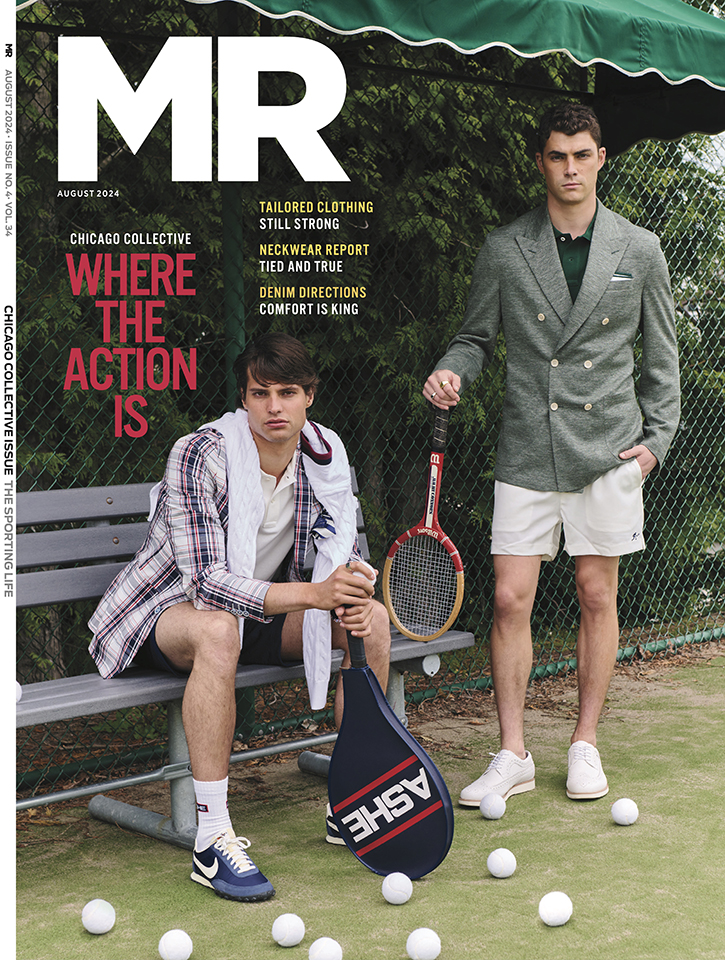


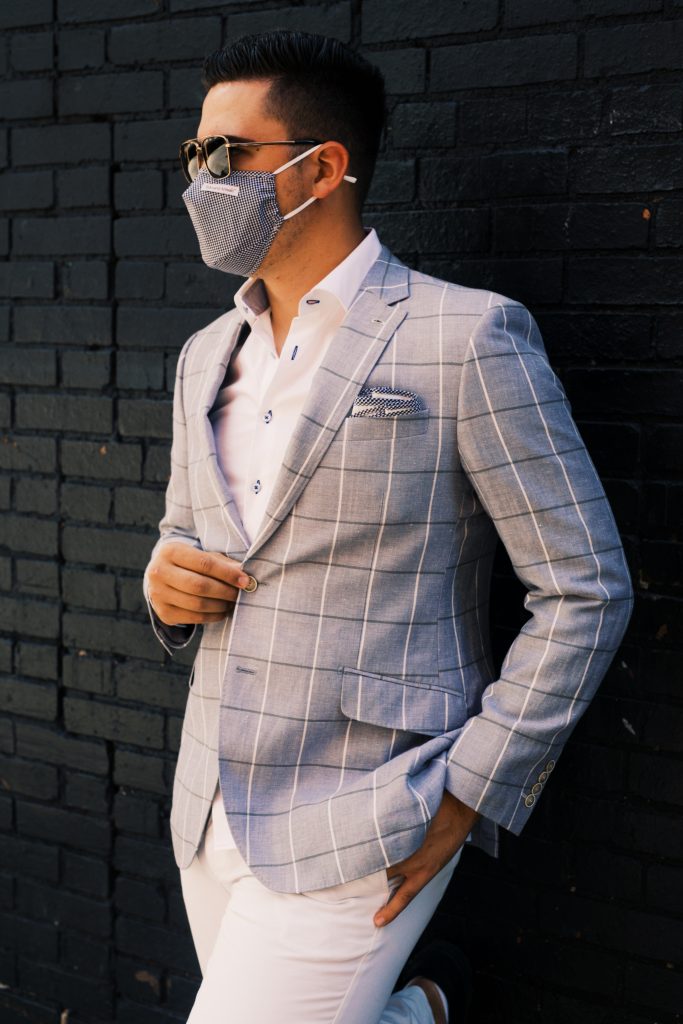
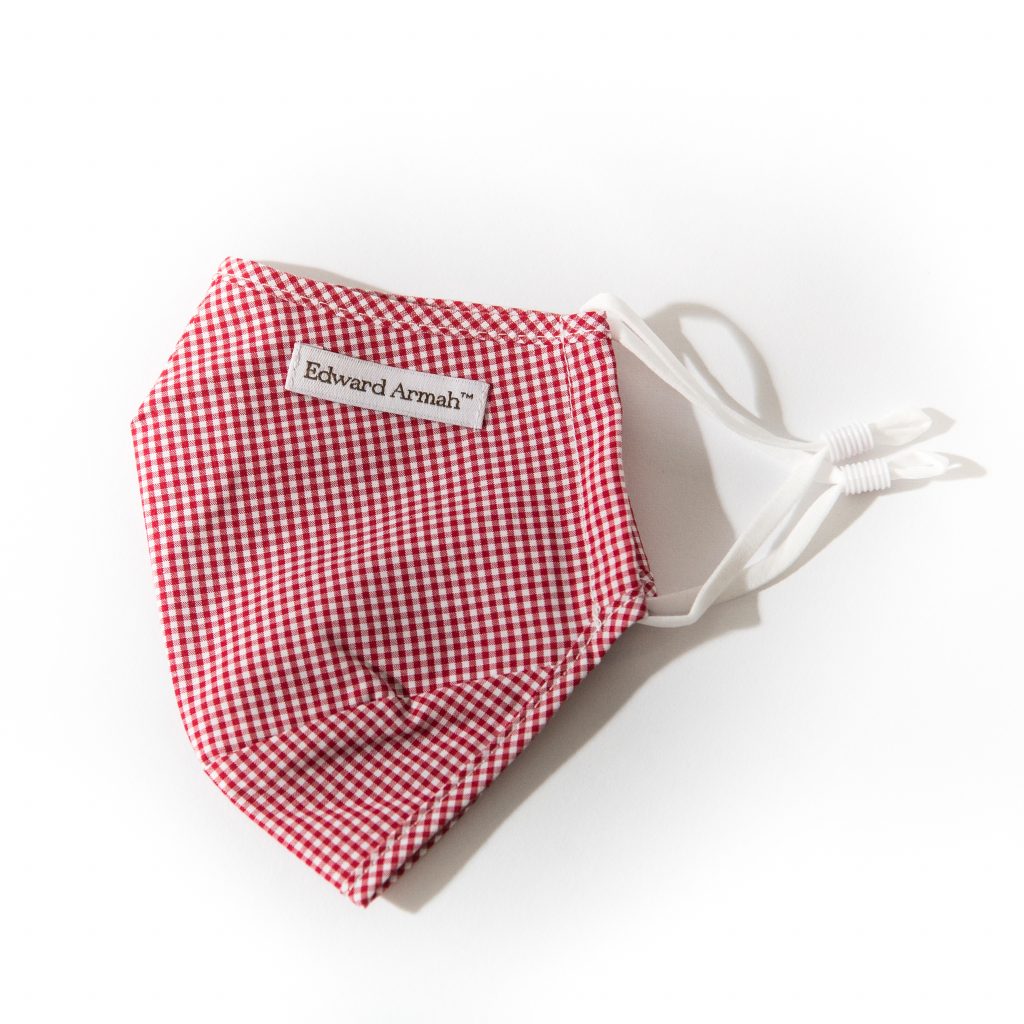
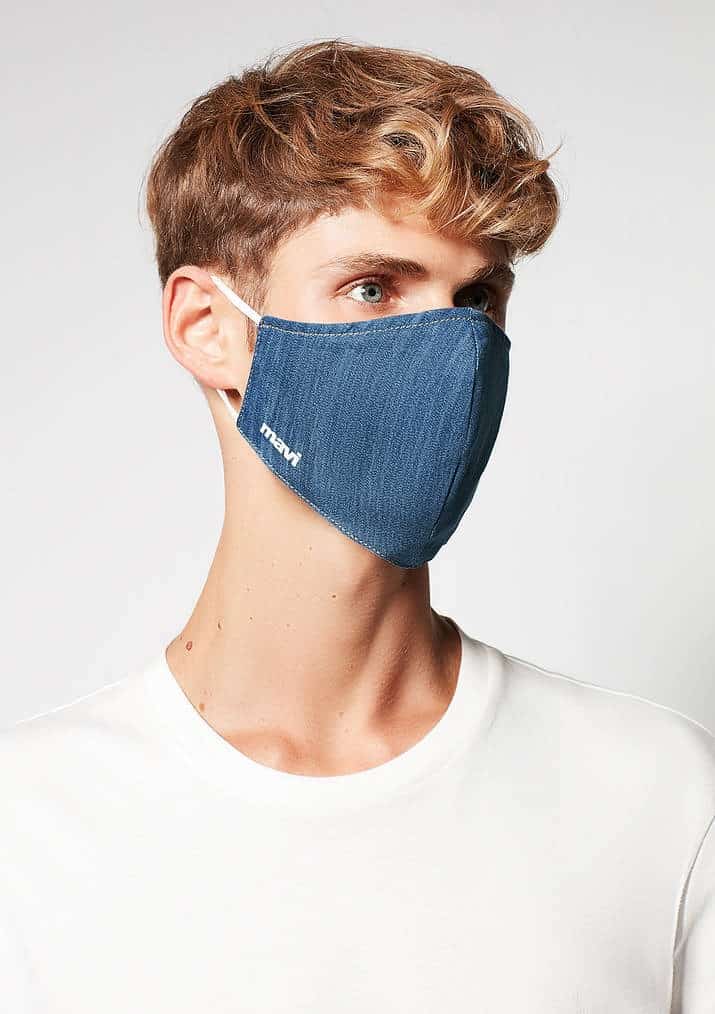
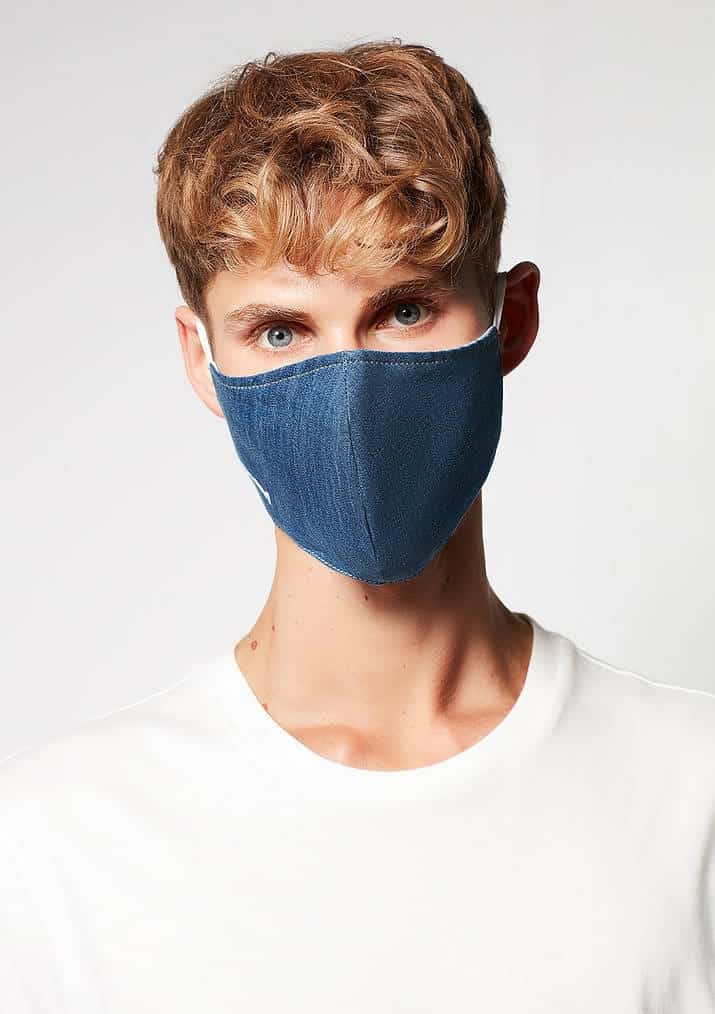
A much better cooler more effective mask is Amic Mask by Ironcloth. This I find to be exactly what We hoped for. Wash it. Re use it.
Samuelsohn has done a great mask that comes with strap extension a 4 filters.
The masks have provided a unique opportunity to make a branding statement as well as provide a safer environment for all of us.